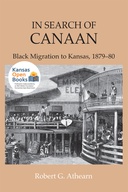Explore

Word spread across the southern farm country, and into the minds of those who labored over cotton or sugar crops, that the day of reckoning was near at hand, that the Lord had answered black prayers with the offer of deliverance in a western Eden. In this vast state where Brown had caused blood to flow in his righteous wrath, there was said to be land for all, and land especially for poor blacks who for so long had cherished the thought of a tiny patch of America that they could call their own. The soil was said to be free for the taking, and even better, passage to the prairie Canaan was rumored to be available to all. . . . Thus began a pellmell land rush to Kansas, an unreasoned, almost mindless exodus from the South toward some vague ideal, some western paradise, where all cares would vanish.In Search of Canaan tells the story of the Black migration from areas of the South to Kansas and other Midwestern and Western states that occurred soon after the end of Reconstruction. Working almost entirely from primary sources—letters of some of the black migrants, government investigative reports, and black newspapers—Robert G. Athearn describes and explains the “Exoduster” movement and sets it into perspective as a phenomenon in Western history.The book begins with details of Exodusters on the move. Athearn then fills in the background of why they were moving; relates how other people—Black and white, Northern and Southern—felt about the movement; examines political considerations; and finally, evaluates the episode and provides an explanation as to why it failed. According to Athearn, the exodus spoke in a narrower sense of Black emigrants who sought frontier farms, but in the main it told more about a nation whose wounds had been bound but had not yet healed. The Republicans, without any issues of consequence in 1880, gave the flight national importance in the hope that it would gain votes for them and, at the same time, reduce the South’s population and hence its representation in Congress. Thousands of Black Americans, many of them former slaves, were deluded by false promises made by individual interests. As the hawkers of glad tidings beckoned to the easily convinced, the word “Kansas” became equated with the word “freedom.” Emotional, often biblical, overtones gave the movement millenarian flavor, and Kansas became the unwilling focus of a revitalized national campaign for Black rights.Athearn describes the social, political, economic, and even agricultural difficulties that Exodusters had in adapting to white culture. He evaluates the activities of Black leaders such as Benjamin “Pap” Singleton, northern politicians such as Kansas Governor John P. St. John, and refugee aid organizations such as the Kansas Freedmen’s Relief Association. He tells the Exoduster story not just as a southern story—the turmoil in Dixie and flight from the scenes of a struggle—but especially as a western story, a meaningful segment of the history of a frontier state. His remarkably objective, as well as suspenseful, account of this unusual episodes contributes significantly to Kansas history, to western history, and to the history of Black people in America.
This book is included in DOAB.
Why read this book? Have your say.
You must be logged in to comment.
Rights Information
Are you the author or publisher of this work? If so, you can claim it as yours by registering as an Unglue.it rights holder.Downloads
This work has been downloaded 14 times via unglue.it ebook links.
- 14 - pdf (CC BY-NC-ND) at Unglue.it.
Keywords
- History of the Americas
- thema EDItEUR::N History and Archaeology::NH History::NHK History of the Americas
Links
DOI: 10.1353/book.81265Editions

